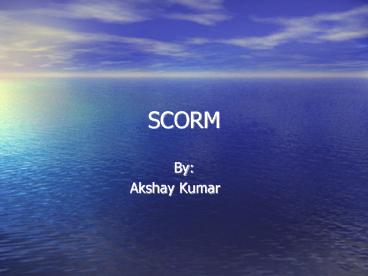SCORM PowerPoint PPT Presentation
1 / 42
Title: SCORM
1
SCORM
- By
- Akshay Kumar
2
What we want?
- What is SCORM?
- Connection with e-learning
- Application of XML Technology
- Technical description about SCORM
- Why it is important to us?
3
Background A Thinking process?
- Design for Reuse
- Whats the right level of granularity?
- Tracking
- Whats the right level of granularity?
- Metadata
- How much is needed?
- LMS
- What does the Table of Content look like?
- Navigation Controls?
4
Granularity and Reusability
Raw Data (Media Elements)?
Information Objects
Learning Objective
Lesson(Aggregation)?
Course(Collection)?
Context
Reusability -
Source Academic ADL Co-Lab (adapted from
Learnactivity)?
5
What is SCORM?
- A software model
- defines the interrelationship of course
components, data models, and protocols such that
content objects are sharable across systems
that conform with the same model. - It is collection of specification adopted
together for achieving some property of content
like Accessibility, Adaptability, Affordability,
Durability , reusability, interoperability
6
(No Transcript)
7
Generalized view of LMS
8
SCORM Content Model Components
- Assets
- building block of a learning resource.
- text, images, sound, assessment objects or any
other piece of data - More than one asset can be collected together to
build other assets. - SCO
- A SCO is a collection of one or more Assets that
represent a single launchable learning resource - tracked by an LMS
9
Conceptual Makeup of SCO
10
SCORM Content Aggregation Model
11
Conceptual Representation of Activity
12
Content Organization
13
(No Transcript)
14
(No Transcript)
15
ltorganizationgt tag
- Title
- Item
- title
- Item
- adlcp timeLimitAction, dataFromLMS,
completionthreshold - imssssequencing
- adlnavpresentation
- Metadata
- imssssequencing
16
Content Packaging
17
(No Transcript)
18
(No Transcript)
19
Adding Sequencing Behavior
- A
- 1
- B
- 2
- 3
20
(No Transcript)
21
Run time environmentCommunicating with the LMS
- / look up window hierarchy to find LMS provided
API / - API.Initialize()
- var name API.GetValue(cmi.learner_name)
- API.SetValue(cmi.score.scaled, 0.9)
- API.Terminate()
22
(No Transcript)
23
API, API instance and API implementation
24
CMI data model element
- Comments From Learner
- Comments From LMS
- Completion Status
- Completion Threshold
- Learner Id
- Learner Name
- Learner Preferences
- etc
25
Conceptual API Instance Transition
26
SCORM Run Time Environment
- fla
27
Continue.
28
Continue.
29
Overall Picture in Meta-Data
- Examples with showing
- APIWrapper.js
- imsmanifest.xml
30
Scope of Adaptation
- SCORM Content Aggregation Model
31
Limitation considered..(one prespecitive)?
- limited adaptivity
- Run time environment do setting of the predefined
rule with key value pair only. We can not change
these values at run time after SCO made. - This is again compact and it can not be used in
different context by simple change. We have to
make a new imsmanifest file for the changed
context of learning.
32
Continue.
- SCORM describes a solutions for systems,
components and content interopability for
learning - Data and Behavioral interoperability
- SCORM does not extend beyond learning to
management of learning - SCORM does not impose any pedagogical or
assessment model - SCORM supports only limited pedagogical features
33
Continue.
- No communication across SCOs
- No access to other SCOs
- SCO has its own behavior
- Using same hierarchy for structure, behavior and
display - Learners are individual
- It can not adapt learner experience without
learner interaction - There is no concept of alternate resource
although we can simulate it by making various
navigation restrictions - There is nothing for picking some of resource
from a collection of resource
34
Development in SCORM
- January 1999 Executive Order 13111 signed
tasking the DoD to develop common specifications
and standards for e-learning across both federal
and private sectors - January 2000 SCORM Version 1.0
- January 2001 SCORM Version 1.1
- October 2001 SCORM Version 1.2
- January 2004 SCORM 2004 (1st Edition)
- July 2004 SCORM 2004 (2nd Edition)
- June 2006 Department of Defense Instruction
(DoDI) 1322.26 Requiring DoD Use of SCORM - October 2006 SCORM 2004 (3rd Edition)
35
SCORM BOOK
- SCORM 2004 3rd Edition Overview
- SCORM 2004 3rd Edition Content Aggregation Model
(CAM) book - SCORM 2004 3rd Edition Run-Time Environment (RTE)
book - SCORM 2004 3rd Edition Sequencing and Navigation
(SN) book
36
SCORM 2004 3rd Edition Overview
- It gives
- an overview of the SCORM 2004 3rd Edition
documentation suite - the SCORM 2004 3rd Edition Conformance Test Suite
- SCORM 2004 3rd Edition Sample Run-Time
Environment.
37
The SCORM Content Aggregation Model (CAM) book
- Describes
- components used in a learning experience
- how to package those components for exchange from
system to system - how to describe those components to enable search
and discovery, - how to define the sequencing rules for the
components.
38
The SCORM SN book
- describes
- how SCORM conformant content may be sequenced
through a set of learner-initiated or
system-initiated navigation events. - The branching and flow of that content may be
described by a predefined set of activities,
typically defined at design time. - how a SCORM conformant LMS interprets the
sequencing rules expressed by a content developer
along with the set of learner-initiated or
system-initiated navigation events and their
effects on the run-time environment.
39
The SCORM RTE book
- describes
- the Learning Management System (LMS) requirements
for managing the run-time environment - The RTE covers the requirements of SCOs and their
use of the API and the SCORM Run-Time Environment
Data Model.
40
Discussion
- ?
41
References
- http//www.adlnet.gov/scorm/index.cfm
- http//www.adlnet.gov/downloads/index.cfm
- http//coe.sdsu.edu/eet/articles/scorm2/index.htm
- http//en.wikipedia.org/wiki/SCORM
- http//www2006.org/programme/files/pdf/p65-poster.
pdf - http//lttf.ieee.org/learn_tech/issues/january2005
/index.html - http//www.lsal.org/lsal/expertise/papers/presenta
tions/id2scorm20030304/id2scorm20030304.pdf - http//www.imsglobal.org
- http//www.imsproject.org/
- http//www.aicc.org/
- http//www.itsc.ieee.org/wg11/files/IEEE_1484.11.1
_D5_submitted.pdf - http//www.itsc.ieee.org/
42
THANK YOU

